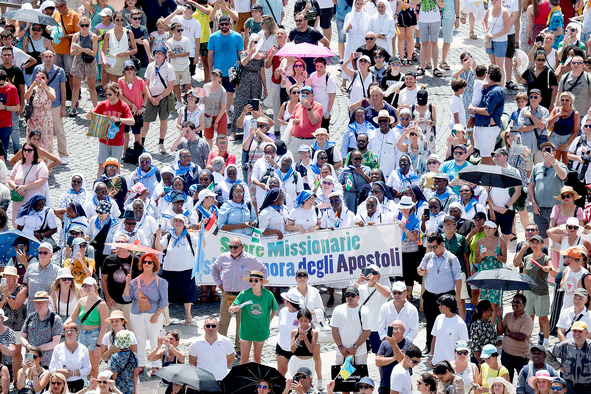
A platform that encourages healthy conversation, spiritual support, growth and fellowship

NOLACatholic Parenting Podcast
A natural progression of our weekly column in the Clarion Herald and blog

The best in Catholic news and inspiration - wherever you are!
Pope: Sow seeds of faith, no matter the timeline
-

Even if the fruits are not immediately visible, Christians are called to sow seeds of faith in the world and people around them in their daily lives, Pope Francis said.
Before praying the Angelus with some 15,000 visitors in St. Peter's Square July 16, the pope reflected on the day's Gospel reading from St. Matthew, in which Jesus tells his followers the parable of the sower.
In Jesus' parable, the seed that falls on rich soil produces fruit, while seed that falls on hard or rocky ground or among the thorns does not. “If the Word is the seed, we are the terrain,” Pope Francis said, “we can receive (the Word) or not.”
The word of God, he explained, is like a seed: “it is small, almost unseeable, but it grows plants that bear fruit” and Jesus is the “good sower” who “never tires of sowing (seeds) with generosity” and calls Christians to do the same.
As an example, the pope said that parents are called to sow seeds of goodness and faith in their children and to not be discouraged if their kids do not seem to understand or appreciate their teachings.
“The good seed remains, this is what matters, and it will take root in due time,” he said. “But if, giving in to doubt, (parents) give up sowing (seeds) and leave their children in the hands of trends and cell phones without devoting time to them, without educating them, then the fertile soil will be filled with weeds.”

Young people, he explained, are called not only to receive seeds of faith but also to “sow the Gospel in the furrows of everyday life.”
Young people, he said, can begin by sowing the Gospel through prayer: “a small seed that is not seen, but with which you entrust to Jesus everything you live through, so he can develop it.”
Pope Francis also suggested young people spend time with people in need. It can seem like time wasted, “but really it is holy time,” he said, “while the apparent satisfactions of consumerism and hedonism leave hands empty.”
The pope also encouraged young people to devote themselves to study, which, like sowing seeds, “is tiresome and not immediately rewarding,” he said, “but is essential to build a better future for all.”
The pope recalled the important role of consecrated religious and laypeople who preach the Gospel “often without recording any immediate successes.”
“Let us never forget, when we announce the word, that even where nothing appears to happen, in reality the Holy Spirit is at work and the kingdom of God is growing, through and beyond our efforts,” he said.
The pope urged Christians to ask themselves how they plant seeds of the Gospel in their work, study and free time. He recalled that he was speaking on the feast of Our Lady of Carmel and asked Mary to help Christians become “generous and joyous sowers of the good news.”
After praying the Angelus, the pope noted that July 19 marked the 80th anniversary of Pope Pius XII’s visit to a Roman neighborhood immediately after it was bombed during the Second World War to show his closeness to the victims of conflict.
“Unfortunately, today too these tragedies repeat themselves,” he said. “How is it possible? Have we lost our memory.”
* * *
In his July 9 Angelus address, the pope said that only by shedding feelings of personal greatness and regaining a sense of wonder in God’s love can people welcome Jesus into their hearts and lives.
The pope reflected on that day’s Gospel reading from St. Matthew in which Jesus praises God the Father for hiding “things” from the wise and revealing them to the childlike.
Those things, Pope Francis explained, refer to Jesus’ miracles – restoring sight to the blind and healing lepers – which are “signs of God acting in the world” that are overlooked by the prideful.
God’s love, as reflected through Jesus’ miracles, “is not understood by those who presume to be great and manufacture a god in their own image: powerful, unyielding, vengeful,” he said.
“These presumptuous ones fail to accept God as Father; those who are full of themselves, proud, concerned only with their own interests: these are the presumptuous ones, convinced that they need no one,” Pope Francis said.
The childlike who are open to receiving God’s love, however, “have hearts free from conceit and self-love,” the pope explained.
“The childlike are those who, like children, feel needy and not self-sufficient; they are open to God and let themselves be astonished by his works,” he said. “They know how to read his signs, amazed by the miracles of his love.”
Pope Francis urged Christians to ask themselves whether they let themselves stop and be amazed by how the signs of God are working in their lives or if they notice them only in passing.
“Our lives, if we think about it, are full of miracles, full of signs of love, of signs of God’s bounty,” he said. “Before these, however, our heart can also remain indifferent and become set in its ways, strangely unable to be amazed.”
– VATICAN CITY (CNS)




